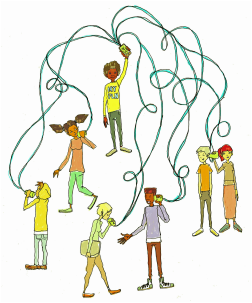
Connectivity - is the defining property of the Social Age, and it is central to the idea of PLN's. Forming connections and relationships with people who can help us learn and or achieve something, is part and parcel of being the social animals we are. But the idea of networking for learning has become more important as a result of the new affordances provided by the internet, smart phones and other mobile communication devices, and Web 2.0 and social media technologies. Our PLN is not limited to online interactions, but it is the ability to connect easily with many people from all over the world, in a sustained manner, that makes the social practice of a PLN so powerful. In a world of just-in-time learning the affordances provided by the internet means it is also possible to find people quickly at the point that a problem has to be solved. Such possibilities were simply not available ten years ago.
When we give something a name it defines the way we view it. The words PERSONAL (meaningful to me), LEARNING (the act of gaining new, or modifying existing knowledge, behaviours, skills, values or beliefs) and NETWORK(S) (a group of people we connect to or who are connected to us), clearly emphasise these three ideas but this definition encourages us to ignore other aspects of the concept.
Our PLN’s often assist and enable us to involve ourselves in something, often to accomplish something we value. PLNs and the relationships we build within them are also a way of involving people in our own life projects and for disseminating the results of our learning. In other words they provide a vehicle for participation and for influencing the thinking and actions of others. These dimensions of activity are camouflaged within the PLN concept.
Our PLN's change through time as we move from formal education, into a career, we change jobs, roles and careers or engage in new projects, and perhaps move to new cities or new countries. Because of this our PLN's have both lifelong and lifewide dimensions. Our development through life, it might be argued, is the result of a constellation of PLN's we have created and been a part of tracking the sorts of changes in our circumstances outlined above.
Our PLN’s vary according to types of knowledge we want to access. If we need to learn complex things like ways of thinking, communicating and behaving in a specific field of social practice, we create networks for learning that will enable us to participate in such social practices and gain access to the embodied knowledge of others who are more experienced and expert than ourselves. To some extent we can engage in conversations through which tacit knowledge can be shared through on-line forum’s but such forms of communication will not allow us to observe people in action and appreciate the nuances of their actions in the particularities of the contexts and situations they inhabit. But there is a world of networking through which people share their personal knowledge, insights and experiences through the medium of the internet. It is these computer-mediated networks for personal learning that have extended our scope for PLN’s.
Our PLN's are central to the idea of learning ecologies 'the complex set of relationships we create in a particular context for a particular purpose that provide us with opportunities and resources for learning, development and achievement'. PLNs are like the blood vessels in our body or the roots and capillary vessels of a tree. They provide the relational structure and means of connecting to others and the means of tapping into the medium and nutrients for learning - the flow of information, knowledge and wisdom within our learning ecology. They connect our ecology for learning with the ecologies developed by others for their learning. So gaining deeper understandings of our PLN's will also help us understand our own ecologies for learning better.
Given that they are so important it is surprising that higher education does little to encourage students to develop and practice the skills of networking for learning: preferring instead to rely on learners assimilating knowledge that has been codified in books. But for most students their future lies in mastering the ability to discover, create and co-create new knowledge to solve their everyday problems in particular situations and contexts. They need to become adept at creating, maintaining and making effective use of the resources contained within their PLN's.
So what might universities do to help students develop this important capability for learning and achieving? There are at least three possible strategies.
1) The professional route - universities might emulate the ways in which professionals working in business and industry develop and maintain their links. A starting point might be to utilise their network of alumni, and involve students in using professional networking platforms like LinkedIn and Academia.edu
2) The subject route - within the programme and the broader social/cultural environment of a department, students could be encouraged to network around social activities, study groups, and projects and assignments that deliberately encourage learners to discover things not only through books but through finding people who can help them.
3) The lifewide route - universities might recognise that students are active networks in other parts of their lives outside the academic programme through which they form PLNs. Perhaps these experiences can be used to explore the idea and practice of networking perhaps in the context of personal development planning?
How important do you feel it is for students to develop their understandings and capabilities for networking and what sort of strategies might or are being used?
Norman Jackson
Founder Lifewide Education
Further reading
LIfewide Magazine June 2015 Exploring Personal Learning Networks (to be published 28/06)
 RSS Feed
RSS Feed
